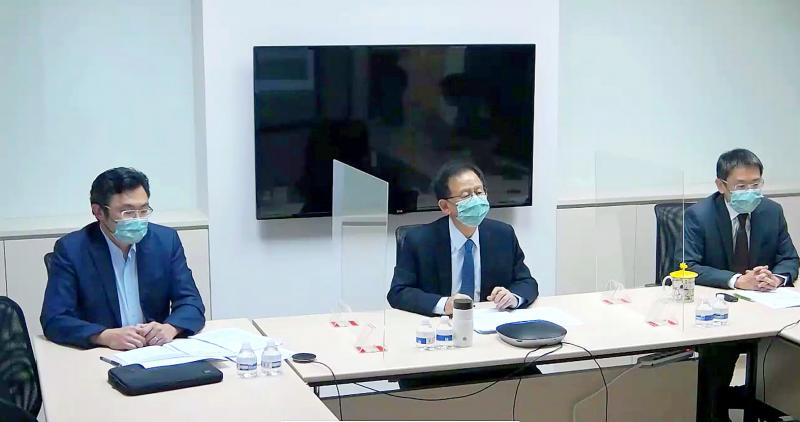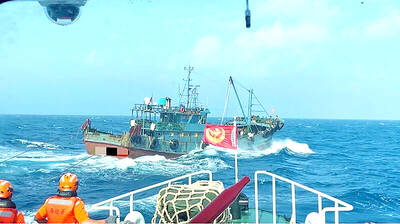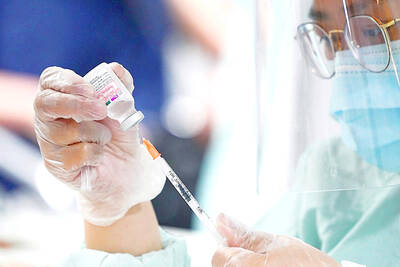Medigen Vaccine Biologics Corp (高端疫苗) yesterday reported positive results from an interim analysis of phase 2 trials for its COVID-19 vaccine, saying that the vaccine demonstrated high seroconversion rates and geometric mean titer (GMT) figures.
A seroconversion rate is the percentage of participants in a trial displaying virus-specific immune memory after being given a vaccine, while the GMT measures the level of neutralizing antibody response, Medigen said.
The experimental vaccine has a seroconversion rate of 99.8 percent and its GMT was 662 among the participants aged 20 to 89, while the gauges rose to 99.9 percent and 733 respectively in participants aged 20 to 64, the company said.

Photo: Screen grab from the Internet
No participants have shown severe adverse reactions, it said.
Only 0.7 percent of participants who were given experimental vaccines had a fever, compared with 0.4 percent in those who received a placebo, while among those who received the vaccine 27.6 percent had muscle soreness and 36 percent felt tired, compared with 16.6 percent and 29.7 percent respectively for those who were given a placebo, it said.
“It would be the regulator that decides if our experimental vaccine has good efficacy, but I personally found the results — the seroconversion rates and the GMT figures — optimistic,” Medigen chief executive officer Charles Chen (陳燦堅) said.
“And it is very safe,” Chen added.
The company will apply to the Food and Drug Administration for emergency use authorization as soon as possible, he said.
However, asked which COVID-19 vaccine developed outside Taiwan that has been granted emergency use authorization Medigen’s experimental vaccine might be compared to, the company said it has not reached a conclusion.
“An estimate needs to be done scientifically. We can conduct an immune-bridging study to compare the antibody levels in people who are given different COVID-19 vaccines, and the WHO is also trying to establish common standards for COVID-19 vaccines,” Medigen head of development Lien Chia-en (連加恩) said.
For example, Medigen’s clinical trial result of a GMT of 662 could be converted into international units (IU) and foreign vaccine developers could do likewise to enable international comparison, Lien said.
“However, this would take some time and other companies have not disclosed their data in IU yet,” he said.
Amid discussions over whether locally developed COVID-19 vaccines would be better than foreign vaccines, Chen and Medigen spokesman Leo Lee (李思賢) said that they are confident in their product and they and their families would get Medigen’s vaccine.
Medigen is to conduct phase 3 trials for its vaccine to earn approval from foreign regulators and it aims to conduct the tests in Europe, Chen said, adding that the UK recently allowed a French company to conduct phase 3 human testing there.
It costs about US$10,000 per participant in phase 3 trials, so the costs would be enormous if Medigen recruited 30,000 participants, Chen said.

The Ministry of the Interior (MOI) is to tighten rules for candidates running for public office, requiring them to declare that they do not hold a Chinese household registration or passport, and that they possess no other foreign citizenship. The requirement was set out in a draft amendment to the Enforcement Rules of the Public Officials Election and Recall Act (公職人員選舉罷免法 ) released by the ministry on Thursday. Under the proposal, candidates would need to make the declaration when submitting their registration forms, which would be published in the official election bulletin. The move follows the removal of several elected officials who were

The Republic of China (ROC) is celebrating its 114th Double Ten National Day today, featuring military parades and a variety of performances and speeches in front of the Presidential Office in Taipei. The Taiwan Taiko Association opened the celebrations with a 100-drummer performance, including young percussionists. As per tradition, an air force Mirage 2000 fighter jet flew over the Presidential Office as a part of the performance. The Honor Guards of the ROC and its marching band also heralded in a military parade. Students from Taichung's Shin Min High School then followed with a colorful performance using floral imagery to represent Taiwan's alternate name

COGNITIVE WARFARE: Chinese fishing boats transmitting fake identification signals are meant to test Taiwan’s responses to different kinds of perceived incursions, a report said Chinese vessels are transmitting fake signals in Taiwan’s waters as a form of cognitive warfare, testing Taipei’s responses to various types of incursions, a report by the Institute for the Study of War said on Friday. Several Chinese fishing vessels transmitted fake automatic identification system (AIS) signals in Taiwan’s waters last month, with one mimicking a Russian warship and another impersonating a Chinese law enforcement vessel, the report said. Citing data from Starboard Maritime Intelligence, the report said that throughout August and last month, the Chinese fishing boat Minshiyu 06718 (閩獅漁06718) sailed through the Taiwan Strait while intermittently transmitting its own AIS

CHINESE INFILTRATION: Medical logistics is a lifeline during wartime and the reported CCP links of a major logistics company present a national security threat, an expert said The government would bolster its security check system to prevent China from infiltrating the nation’s medical cold chain, a national security official said yesterday. The official, who wished to stay anonymous, made the remarks after the Chinese-language magazine Mirror Media (鏡周刊) reported that Pharma Logistics (嘉里醫藥物流) is in charge of the medical logistics of about half of the nation’s major hospitals, including National Taiwan University Hospital and Taipei Veterans General Hospital. The company’s parent, Kerry TJ Logistics Co (嘉里大榮物流), is associated with the National Committee of the Chinese People’s Political Consultative Conference (CPPCC) and the Chinese People’s Liberation Army (PLA), the